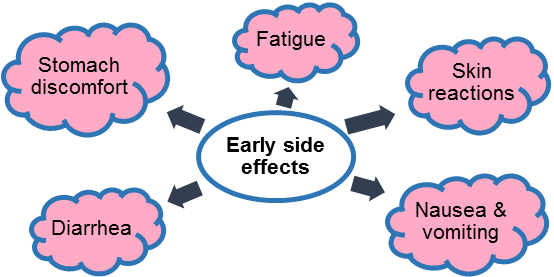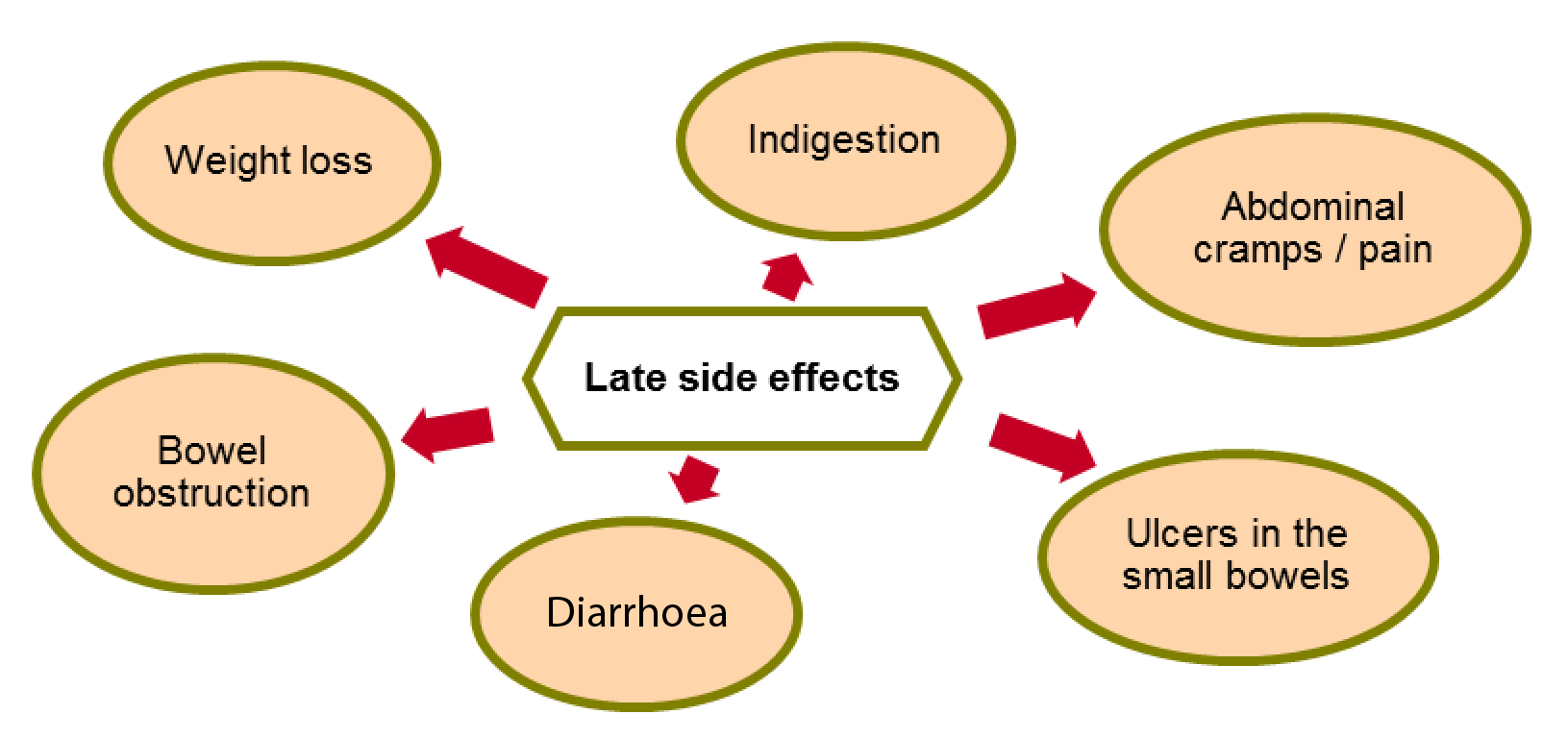
Abdomen radiotherapy may be given to the middle part or one side (left or right) of the abdomen. The normal tissues that are sensitive to radiation in this area are the inner surface of the lower part of esophagus, stomach, part of the small and large intestines.
What Are The Early Side Effects?
Early side effects are the changes or reactions of normal tissues that happen during radiation treatment. The reactions are more serious if there are a lot of normal tissues in the treatment area and if the total radiation dose to the normal tissues is higher.
Some early effects of abdominal treatment that may occur are listed in the graphic. Most of these effects may begin about 2 to 3 weeks after getting radiation treatment, with moderate symptoms and will become better after the treatment has stopped.

Fatigue
This is a general side effect of radiotherapy. The effect is more obvious if the person has not been eating properly and has problem with bowel changes. For further explanation on fatigue and care, please refer to Radiotherapy Side Effects/ Non Specific and Specific Effects/ Fatigue.
Skin Reactions
Skin reactions in the treatment area are minimal, with skin become red and slightly dry. For instructions on care of the skin, please refer to Radiotherapy: Skin Reactions and Care / How to Take Care Skin and Reduce Reaction?
Nausea and Vomiting
Radiation causes inflammation to the inner surface of esophagus producing nausea and vomiting. Nausea is the feeling of uneasiness in the throat and discomfort in the abdomen. Sometimes there may not be any vomiting. This reaction is more common if the treatment area involved a large part of the esophagus and stomach (upper abdomen).
The effect may take place in the second week of treatment, as early as a few hours after getting the radiation exposure. These side effects will get worse if chemotherapy is given together with radiotherapy.
Stomach Discomfort And Indigestion
Changes to the inner surface of the digestive tract due to radiation will affect the normal process of food digestion and produces the feeling of fullness (bloating / wind). Radiation can also cause stomach ulcers and muscle cramps making the person feel uncomfortable.
Symptoms of nausea, vomiting and stomach cramps may influence a person’s appetite and interest in food. These side effects can be relieved with medications. Sometimes this uneasiness can be reduced by making changes and choosing more suitable food, please refer to Chest Radiotherapy: Side Effects And Care/ How To Improve Food Intake?
How To Minimize Nausea And Stomach Discomfort?
|
|
|
Try to get plenty of fresh air and stay away from stuffy environment or room with cooking odors. Do some relaxation activities such as light reading, listening to soothing music, watching movies or videos, even doing some simple physical movement or dance steps can help to shift your focus away from the discomfort and distress.
Diarrhoea
Radiation can cause changes to the intestinal movement. Diarrhoea occurs if the need to go to the toilet is more than 4 times a day, with contents that is soft and watery. This reaction is more common with radiation treatment to the lower part of abdomen.
The anal area may become red and sore. Clean with water gently and use baby wipe instead of toilet rolls.
Let the oncologist know about your conditions so that medication can be given to reduce the effects. Symptoms may also be reduced by choosing more suitable food and method of food preparation.
How To Reduce Diarrohea?
Bowel changes can make a person very tired and lose interest in food. When a person is not eating well, he or she may become weak because of not enough nutrients. Seek help from a dietitian to improve food intake and to assist with nutritional supplement. Good nutrition support is very important for the person’s wellbeing and to speed up the healing process.
|
|
|
Are There Any Late Side Effects?
Late side effects are reactions that may occur months or years after radiation treatment has stopped. Late effects of abdomen radiotherapy are rare with the application of up-to-date radiation treatment technique. Some late effects that may occur are like the ones shown in the graphic, which may be controlled with medication and reduced by selecting more suitable food.

Radiotherapy is designed specially for each individual, taking into consideration the effects of radiation on normal tissues in the treatment area. However, every person is unique and may react differently to the radiation treatment.
Find out information about the specific side effects that may occur with your treatment from the radiation oncologist and radiation therapist before treatment begins. Always let them know what you are experiencing and how you feel so that they can help you to minimize the symptoms, to reduce anxiety and to cope better.
References
- http://www.cancer.org/treatment/treatmentsandsideeffects/treatmenttypes/radiation/understandingradiationtherapyaguideforpatientsandfamilies/understanding-radiation-therapy-radiation-to-certain-body-parts
- www.cancer.gov
- www.openclipart.com
- Graphics from Ms Aisyah Zulkifli
| Last Review | : | 26 May 2017 |
| Writer | : | Sarah Lee Abdullah |
| Accreditor | : | Dr. Ros Suzana binti Ahmad Bustamam |







